|
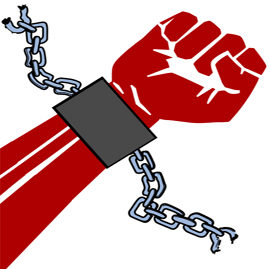 |
CRY FREEDOM.net
formerly known as
Womens Liberation Front
MORE INSIGHT MORE LIFE
Welcome to cryfreedom.net, formerly known as.Womens Liberation Front.
A website
that hopes to draw and keeps your attention for both the
global 21th. century 3rd. feminist revolution as well as especially for
the Zan, Zendagi, Azadi uprising in Iran and the struggles of our
sisters in Afghanistan.
This online magazine will
be published evey month and started December 2019. Thank you for your
time and interest.
Gino d'Artali
indept investigative
journalist
radical feminist and womens' rights activist
|
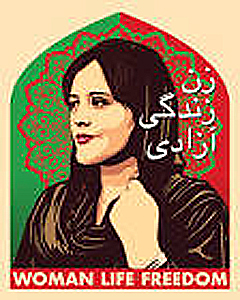 |
|
CLICK HERE ON HOW TO READ
ALL ON THIS PAGE
When one hurts or kills a women
one hurts or kills hummanity and is an antrocitie.
Gino d'Artali
and: My mother (1931-1997) always said to me <Mi figlio, non esistono
notizie <vecchie> perche puoi imparare qualcosa da qualsiasi notizia.>
Translated: <My son, there is no such thing as so called 'old' news
because you can learn something from any news.>
Gianna d'Artali.
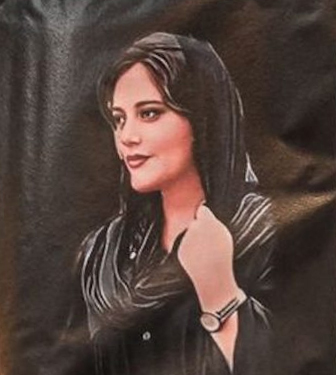

JINA MAHSA AMINI
The face of Iran's protests. Her life, her dreams
and her death.
In memory of Jina 'Mahsa' Amini, the cornerstone of the 'Zan.
Zendagi. Azadi revolution.
16 February 2023 | By Gino d'Artali
And also
Read all about the assasination of the 22 year young Jhina Mahsa
Amini or Zhina Mahsa Amini (Kurdistan-Iran) and the start of the Zan,
Zendagi, Azadi (Women, life, freedom) revolution in Iran
2022
and the latest news about the 'Women Live Freedom' Revolution per month in 2023:
September 30 - 16
--
September 17 - 1
--
August 31 - 18
--
August 15 - 1
--
August 15 - 1--July 31
- 16
--
July 15 -1--June
30 - 15--June 15-1--May 31 -16--
May 15-1--April--March--Feb--Jan
So here is where the protests continue and I'll continue to
inform you about it. That's my pledge.Gino
d'Artali
Indept investigative journalist
Read also all about the uprising and revolution
around the one-year anniversary of the death of Jina Amini in custody.
CLICK HERE ON HOW TO READ
ALL ON THIS PAGE
When one hurts or kills a women
one hurts or kills hummanity and is an antrocitie.
Gino d'Artali
and: My mother (1931-1997) always said to me <Mi
figlio, non esistono notizie <vecchie> perche puoi imparare qualcosa da
qualsiasi notizia.> Translated: <My son, there is no such thing as so
called 'old' news because you can learn something from any news.>
Gianna d'Artali.
Note by Gino d'Artali: The Zan, zendagi, azadi!> (Women, life,
freedom) will only then end when khamenei and his
puppets i.e. the morality police, the basijis and the irgc give way or go away!!
And
For all topics below that may hopefully interest you click on the
image:
|
'THE NO-HIJABIS
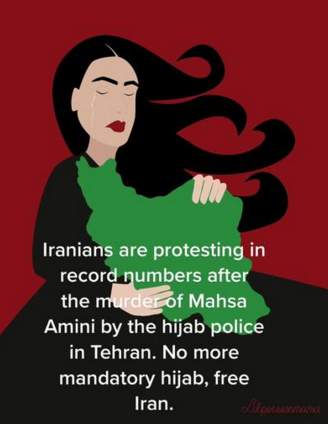
Updated September 15, 2023 |
'BIOLOGICAL
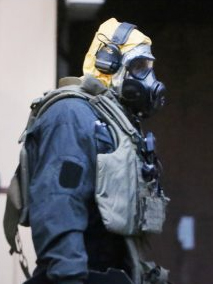
TERROR ATTACKS
AGAINST SCHOOLGIRLS'
Updated September 6, 2023 |
'IRANIAN JOURNALISTS
UNDER SIEGE'

Updated September 19, 2023 |
'BLINDING
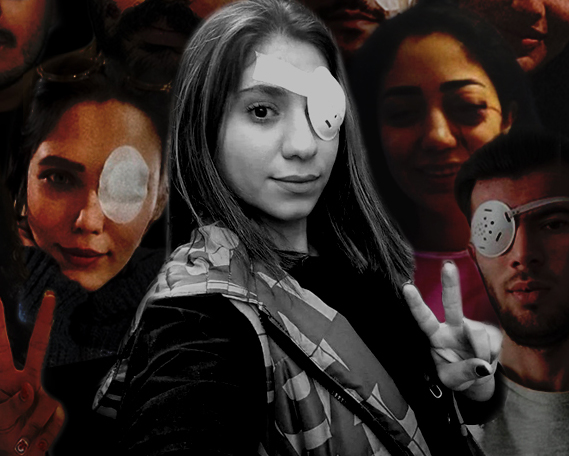
AS A WEAPON'
Updated September 14, 2023 |
'THE HANGING SPREE'
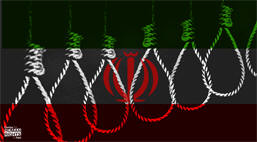
Updated September 6, 2023
|
|
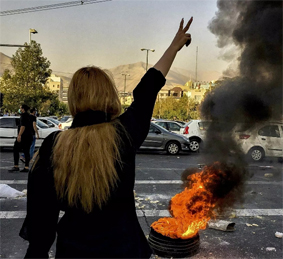 |
'TO WEAR
OR NOT TO WEAR A HIJAB i.e. TO BE OR NOT TO BE A FREE WOMAN'
|
|
|
|
|
|
September 15 - 12, 2023
UPDATES
<<Proposed hijab
penalties in Iran: 'They can't prosecute millions of women'....
and
<<Global Trade Union Condemns Escalating <Repression> in Iran....
and
<<MAHSA AMINI, A YEAR ON
Iran's regime has crushed anti-veil protests, but it has ‘lost the
battle’ for credibility....
|
September 7 - 1, 2023
<<Iranian Engineer Who Protested Forced Hijab
Sentenced to 74 Lashes...
and
<<Iranian government uses
paramilitary groups against protesters...
and
<<'Women will not bow to the
Taliban'...
and
<<Lawyer Meets Iranian Singer Jailed
for Supporting Women's Rights...
and
<<Hijab law slammed as <gender
apartheid> by UN experts... |
below links to September
15 -August 4, 2023
Updates September 15 - 12, 2023
<<Proposed hijab penalties in
Iran: 'They can't prosecute millions of women'....
and
<<MAHSA AMINI, A YEAR ON
Iran's regime has crushed anti-veil protests, but it has
‘lost the battle’ for credibility....
September 7, 2023
<<Hijab law slammed as <gender
apartheid> by UN experts...
August 30, 2023:
<<Female Students Told to Wear
Hijab and Keep Quiet – Or Get Expelled....
and
<<Yasaman Rezaei Babadi:
Threatened with Rape if She Didn't Confess....
and
<<Where is Parmida, Who Said <I'm
a Woman, Don't Intimidate Me with Anything>?...
The new chasity bill: a compulsive
wearing of a chador?
NO WAY!...
and earlier news
<<The Hijab and Chastity Bill: Parliamentary
Commission Approves 39 Articles...
and the below opens in a new window:
<<Iran's President Ebrahim Raisi threatens women
who remove their hijab....
and
<<Iranian regime's paradox in imposing the
compulsory Hijab>>....
and
<<Tehran Municipality to Deploy 400 Suppressive
‘Veil Watchers’ to Clamp Down on Women....
and more news
Clicking on the
above link will bring you to August 2023 part 1 |
A re-newed call to
partipate at the upcoming commemoration of the killing of Jina Amini:
http://www.cryfreedom.net/2022-2023-commemoration-of-Jina-Amini.htm
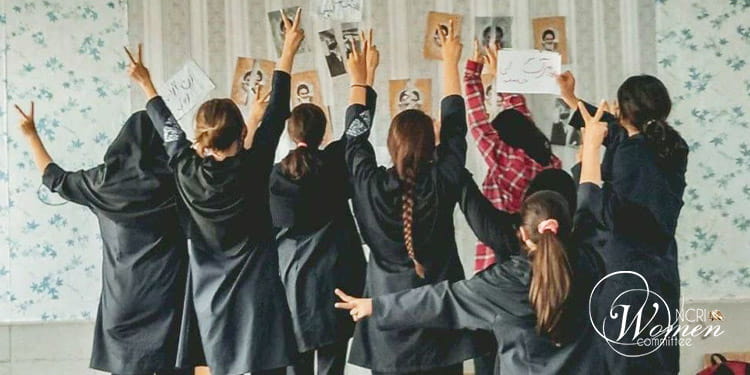
...requirement for women and girls-both teachers and students-to wear the black
head-to-toe Chador?
We say NO: Give In or Give Way!
Updates September 15 - 12, 2023
France 24 | The Observers - September 15, 2023 - By Eliani Ershab
<<Proposed hijab penalties in Iran: 'They can't prosecute millions of women'
One year ago this Saturday, 22-year-old Mahsa Amini died after being arrested by
Iran's morality police for wearing her hijab <improperly>. Her death led to
massive anti-regime protests, known by their now-iconic slogan: <Woman, Life,
Freedom>. The Observers team has been in regular contact with dozens of women
across Iran over the past 12 months. Many of them have told us that it has
become the <new normal> for millions of women in Iran to go out in public with
their hair uncovered. But with a new law under discussion that would massively
increase the penalties for hijab-related offenses, how long will these new
freedoms last? While a year ago it was unusual to see women without hijab in
public spaces in Iran, thousands of amateur images posted online - and the
accounts of women inside the country – show that millions of Iranian women now
routinely go out in public without the Islamic head covering. A new law is under
discussion in the Iranian parliament that would increase the penalties for the
improper wearing of hijab from the equivalent of 1 euro to 3,000 euros, and the
maximum prison sentence from two months to 10 years. The proposed law has
special measures for so-called <celebrities>, including the confiscation of 10
percent of their assets. 'I no longer wear hijab in public spaces'
Sita (not her real name) is a young Iranian university student who lives in
Tehran. Although she grew up in a religious family, she has decided to stop
wearing a hijab. <After the protests started, this question in my head became
louder and louder: Why do I have to seek permission from the state - from an
ideology that I don't even believe in - to live the way I want to live? I have
found new courage to stand up for my choices, despite the risks.
In the last year, many things have changed for me. The first change was in my
family. I feel that they are much more open-minded and look at women differently
than they used to. Since the death of Mahsa Amini, I no longer wear hijab in
public spaces. Society has generally been supportive. Before the protests, if
you went out in public without hijab, people would stare at you, even other
women. Now, the most common reaction is a simple smile. Sometimes people say
encouraging words when they pass by. History has taught us that any change in
society is difficult, and entrenched ideologies are difficult to crack. Despite
all this, I see many changes in society. I have the feeling that many people who
are religious and observant have asked themselves this question: <If I have the
freedom to lead the lifestyle I choose, then girls and women on the street who
do not wear hijab should have the same right to dress the way they want. We've
seen that Iranians are willing to pay the price for supporting women. The cafe
owner accepts that his café might be closed down for a few days, but he does not
ask the women in his café to wear the hijab. When men fight like this for
women's rights, it shows that a revolution has happened in a macho society.>
'They can’t prosecute the millions of women in the streets'
The <celebrities> targeted by the draft law could include social media
influencers. One of the favourite targets for arrests by Iranian security forces
in the weeks before the anniversary has been female influencers who post images
of themselves without hijab to their tens of thousands of followers. In recent
months, several Iranian influencers have been arrested, among them a female
motorcyclist, a young lifestyle and fashion influencer, a travel blogger and
Sar, a teenager whose video of her with her friends in a shopping mall went
viral.
Varia (not her real name) is a lifestyle influencer who lives in Shiraz. She
talks about the pressure influencers face.
<It's scary. Every day I hear that a friend or colleague has been arrested,
their bank account frozen or their car impounded. But I am glad that there are
so many women who resist despite the threats and pressure by the regime. Even if
they silence women who are so-called <celebrities>, they cannot prosecute the
millions of women in the streets. The most impressive change I have observed
since a year ago is that verbal harassment of women on the street - which used
to be not uncommon - has decreased. I have not had a bad experience in a year,
even though I'm downtown working every day. The private sector does not dare to
require its female employees to wear hijab. As far as I can tell, people have
made their peace with women's personal choice. And what is even nicer is that
these changes can be observed not only in the rich neighbourhoods of Tehran, but
also in the poor neighbourhoods in the south of Tehran and in other cities.
These changes are permanent, I think, they are the result of 40 years of
resistance.>
Iranian authorities have also targeted Iran's fast-growing start-up industry,
accusing it of propagating Western values by allowing women to go to work
without a hijab. In recent months, several start-ups were targeted by security
forces. Some of them had to stop working for weeks, others had their
headquarters attacked or their executives arrested.
Shamila (not her real name) is a senior executive at a start-up in Tehran. She
talks about her experience over the past year.
<Most people who work in startups support the <Women, Life, Freedom> protests.
Most women at start-ups like ours refuse to wear hijab. However, it is easier to
bully start-ups than millions of women on the streets, one by one. The
authorities send threatening letters and sometimes order start-ups to close
their office for a few days. The companies that own the start-ups just want to
avoid headaches and keep the money flowing. I think this will force more
Iranians than ever - especially talented women working in these startups - to
migrate abroad.>
The women we have been speaking to believe - or hope - that the protests sparked
by Mahsa Amini's death have changed Iranian society forever. But they say there
is more to be done to remove the theocratic regime that governs their lives, and
they will keep fighting.
Varia, the influencer, says:
<For months I was preoccupied with the price we pay for these changes: People,
teenagers and even children who have lost their lives. I wish all that spilt
blood had made a bigger difference. But I think all that pain has led our
society to where we are now. This bloodshed has made the equation clear to
everyone in Iran, I think: either we put an end to them or they put an end to
us, there is no middle ground.>
Sita is also optimistic about the future:
<The war is not over yet, but so far we have won some battles. You can see by
their actions that the regime is desperate; they are arresting singers,
journalists, university professors. But I'm optimistic about the future of our
country. I'm really focused on the present. What can I do? How can I help the
protests to succeed?> >>
Source:
https://observers.france24.com/en/middle-east/20230915-proposed-hijab-penalties-in-iran-they-can-t-prosecute-millions-of-women
Iranwire - September 13, 2023
<<Global Trade Union Condemns Escalating <Repression> in Iran
A global trade union representing over 200 million workers has condemned the
<intensification of repressive measures> targeting teachers, journalists, trade
union activists, student activists and women's rights defenders in Iran. <We
denounce this repression and urgently call for its cessation, thereby enabling
trade unionists to defend and uphold workers' rights in Iran, a cornerstone of
any democratic society,> the Council of Global Unions (CGU) said in a statement
on September 12 amid a sweeping crackdown on dissent ahead of the first
anniversary of nationwide protests sparked by the death of Mahsa Amini in police
custody. The Coordinating Council of the Iranian Teacher Trade Associations, the
Union of Workers of Tehran and Suburban Bus Company and the Association of
Iranian Journalists face <relentless harassment, arrests, prolonged detentions,
and torture in prison,> it said. The organization also expressed concern about
the <increasing influence> of the morality police and their enforcement of the
Islamic Republic's mandatory hijab law to <harass women and prevent their access
to education.> The CGU called on the Iranian authorities to <respect
international labour standards, in particular freedom of association, and ensure
that principles of human rights, justice, dignity and fairness prevail.> It also
expresses solidarity to women's rights defenders in Iran <in their struggle for
a democratic and secular society.> >>
Source:
https://iranwire.com/en/news/120437-global-trade-union-condemns-escalating-repression-in-iran/
France24 - September 12, 2023 - By Leila Jacinto
<<MAHSA AMINI, A YEAR ON
Iran's regime has crushed anti-veil protests, but it has ‘lost the battle’ for
credibility
One year after Mahsa Amini died in police custody, sparking nationwide protests,
the Iranian regime has quashed all displays of public discontent. But the 2022
protest movement was not a lost cause and its impact on Iranian history cannot
be undermined. The crackdown was increasing, the screws of repression getting
tighter, in the weeks leading up to the first death anniversary of Mahsa Amini,
also known as Jina Amini. The 22-year-old's death in police custody on September
16, 2022, sparked protests across Iran for months until the authorities
responded with brutal tactics, forcing protesters indoors or into exile. But
with the anniversary of Amini's death approaching, the regime was taking no
chances. Weeks ahead of the one-year milestone, the families of protesters
killed by security forces were barred from holding commemorative gatherings at
their graves, in what Amnesty International called the <cruellest restrictions>.
Several women’s rights activists were also detained and accused of planning
events to mark the death anniversary, according to Human Rights Watch. A year
ago, Amini was arrested by Iran's Gasht-e-Ershad - or guidance patrols, better
known as the <morality police> – for <improperly> wearing the mandatory hijab.
As enraged female protesters took to the streets, many defying the hijab rules -
some burning their headscarves and cutting locks of hair - there were reports
suggesting the Gasht-e-Ershad had been suspended. But since mid-July, the
morality police squads have been back on Iran's streets, aided by other security
forces. In early August, President Ebrahim Raisi took to the airwaves to tell
the Iranian people they should not <worry> because, he promised, <the removal of
the hijab will definitely come to an end>. A new <Hijab and Chastity> bill is
now working its way into law, with a package of repressive measures, including
exorbitant fines for hijab offenders and increased police surveillance. Iranians
have a lot to worry about, including the rising cost of living, hyperinflation,
corruption, economic collapse, and isolation under international sanctions while
the regime plays hardball in nuclear negotiations. The prospect of women
revealing their hair in public does not top the list of concerns for most
Iranians. But for their unpopular president, it's a major worry. The veil in
Iran symbolises much more than just a hair-covering garment. The death in
custody of one young woman, hailing from the marginalised Kurdish-Sunni
periphery of the official Shiite state, exposed the weakness of the Islamic
Republic four decades after the 1979 revolution. A year after Amini's demise,
that chapter in Iran’s post-revolutionary history is still being written and it
could have dramatic consequences for the country – as well as the international
community.
'A very fragile moment for Iran'
Since the protests erupted last year, Iranian authorities have used a
combination of old and new measures to suppress public anti-regime displays.
Security forces killed at least 537 protesters, the majority in the first months
of the protests, according to an April 4 report by Oslo-based NGO, Iran Human
Rights. At least seven men have been executed in connection to the protests
following <hasty proceedings>, noted a UN-appointed Independent International
Fact-Finding Mission. The appointment of the fact-finding mission on November 24
was hailed as a <landmark> by rights groups and came after intense negotiations
at the Geneva-based Office of the UN High Commissioner for Human Rights. In its
first oral report presented in July, the fact-finding mission noted that Iranian
authorities had not yet responded to repeated requests for a visit. <Even today,
ten months after the events, no official data is publicly available regarding
those arrested, detained, charged or convicted in connection with the protests,>
the team noted. In other words, it was business as usual for the Iranian regime
after yet another crackdown on yet another round of protests that have been
erupting with increased frequency over the past decade.
But this time, some unfamiliar suppression tactics were also applied, and they
were disquieting.
As the number of defiantly unveiled women in public soared, the Islamic regime
targeted prominent female influencers, including actresses, with dubious
psychiatric diagnoses. As judges sentenced women to treatment for <anti-family
personality disorder>, Iranian mental health organisations warned that the
authorities were <exploiting psychiatry>. A year after Amini's death in custody,
the figures may be disputed, but the facts are clear. <The government has very
effectively crushed the protests that erupted last year. But anger at the regime
is even worse,> said Barbara Slavin, distinguished fellow at the Washington
DC-based Stimson Center. <The regime has been very effective in terms of
repression, but it's been a total failure at improving the lives of ordinary
Iranians.> The explosive mix of public rage and regime suppression makes it hard
to say who really won the day, much less the year. <It's a mixed picture: on the
one hand, society is miserable, angry, restive. On the other hand, Iranians have
shown that the regime no longer calls the shots,> said Slavin. <It's a very
fragile moment for Iran.>
'Women, Life, Freedom'
The fragility was exposed last year by women, the officially fragile 51 percent
of Iran's 87 million population. Adopting the rallying cry, <Zan, Zendegi,
Azadi> - Women, Life, Freedom - Iran's women led the latest charge against the
regime with a mix of courage, creativity and doggedness that electrified the
world. Since the 1979 revolution, women have been used as a political symbol by
the Islamic Republic, with the veil promoted as the most manifest proclamation
of its values. More than 40 years later, that political symbolism provided the
seed for its own unraveling.
<Heavily discriminating against women in all aspects of life, the Islamic
Republic's policies on compulsory veil emerges throughout the years as the
symbol of its control over women’s bodies and life. Regardless, Iranian women
have remained courageously outspoken for their rights, while having paid and
continuing to pay a high price for their dissent,> said Azadeh Pourzand, senior
fellow at the Center for Middle East and Global Order. While the government is
pushing for the adoption of the <Hijab and Chastity> law, Slavin doubts it will
end the regime's worries. <Overall, the government has lost the battle for the
obligatory hijab - they can't arrest all the women going around without hijab,>
she explained. <They've lost the battle, they simply refuse to admit it.>
Despite the tightened restrictions, many Iranian women are putting up a fight,
with some displaying exceptional bravery. Weeks before Amini's death
anniversary, firebrand Iranian labour activist Sepideh Qoliyan got a warning by
a criminal court judge that she could face additional charges if she continued
to appear in court without a veil. It came a month after an earlier court
hearing was cancelled because Qoliyan refused to wear the mandatory hijab. The
28-year-old activist remains in prison while she fights two separate charges,
including insulting Iran's Supreme Leader Ayatollah Ali Khamenei.

Meanwhile Nazila Maroufian, the Iranian-Kurdish journalist who interviewed
Amini's father last year, walked out of Tehran's notorious Evin prison on August
13 and posted a photograph on social media of herself without a headscarf and
the slogan, <Don't accept slavery, you deserve the best.>
She was promptly detained again, released on bail and then re-arrested. On
September 4, an Iranian judge sentenced Maroufian to a year in prison, ensuring
the now-prominent journalist would be locked behind bars on Amini's first death
anniversary. Iranian women and girls taking to the streets were immediately
joined by male protesters who grasped the symbolism of the veil in their demand
for total change. The unofficial anthem of the Women, Life, Freedom movement was
written by a young man and recorded in his bedroom in the Iranian coastal city
of Babolsar. Shervin Hajipour wove tweets of protest-supporters into the lyrics
of his song, Baraye, or <For> in English. He was arrested and released on bail
when he won a special Grammy award in February for his powerful, haunting
single. The song title comes from #Baraye, a hashtag Iranians used to explain
why they were protesting. One of the tweets in the song simply states, <For
yearning for an ordinary life> - a central demand of the primarily young
protesters. The Gen Z component of the protests was particularly noteworthy,
distinguishing it from previous Iranian protest movements, explained Iran-born
and UK-based Pourzand. At 38, Pourzand belongs to the <Green movement>
generation of protesters who took to the streets to challenge the results of the
2009 presidential elections, which denied a victory to the reformist candidate.
<My generation thought patience is a value, that incremental change is a value
worth holding on to,> she explained. <We thought we had to pick between the bad
and worse. 'Better to work for the bad - what if, what comes next is the worse,'
describes the reform movement.> Iran's Generation Z, those born between 1997 and
2010 - or 1375-1389 in the Iranian calendar and dubbed Dahe Hashtadi (<the
Eighties>) in Persian - displayed the impertinence and impatience of youth. This
included a total rejection of the post-1979 edifice, complete with ripping and
burning posters of Supreme Leader Khamenei. The leaderless, social media-driven
nature of the movement raised immediate doubts over whether the young protesters
had the mobilisation capacity to topple the regime. But in their failure to
bring immediate change, Generation Dahe Hashtadi did not fare any worse than
their parents, analysts concede a year later. What's more, in a country with a
long protest culture, they fundamentally altered the discourse by calling for a
dismantling of the republic itself. <They got together, they figured a message
quickly and effectively, and the whole world heard it,> said Pourzand. <'Women,
Life, Freedom' divided Iran's history into a ‘before’ and 'after'. I don't think
the regime can take it back to before this movement.> Referring to the Iranian
saying, <the fire under the ashes>, Slavin says the smoldering anger cannot be
extinguished by a deeply discredited regime using the old repression techniques.
<Iranians understand this is a long struggle, they are very determined,> she
explained. A year after Amini's death, the state of the republic appears to be
as frail as that of the 84-year-old supreme leader, Ayatollah Khamenei. <People
have been calling 'Death to the dictator' for the past four to five years. They
hate him,> said Slavin. Khamenei's most likely successor list includes President
Raisi and the octogenarian supreme leader's son, Mojtaba Khamenei. Both men lack
popular support, according to analysts. <Khamenei has been trying to arrange for
his son to succeed him. The hypocrisy of the regime is beyond all calculations,>
said Slavin. <Someday it will fall and people will celebrate - just when and how
it happens, people can’t predict.>>
Source:
https://www.france24.com/en/asia-pacific/20230912-iran-s-regime-has-crushed-protests-but-lost-the-battle-for-obligatory-hijab
Iranwire - September 7, 2023
<<Iranian Engineer Who Protested Forced Hijab Sentenced to 74 Lashes
An Iranian woman who made headlines in February after protesting the mandatory
hijab during a meeting of engineers in Tehran has been sentenced to 74 lashes
for <offending public decency.> The sentence, which was handed down on September
7, is suspended for five years, meaning that the punishment will be carried out
if Zeinab Kazemi commits another <criminal offense> during that period. <I have
never regretted raising my voice for justice and against oppression, and I still
don't,> the defiant engineer wrote on Instagram after the sentencing. In a video
published on social media on February 17, Kazemi protested against her
disqualification from a vote at the Tehran Engineers Assembly due to
noncompliance with the Islamic Republic's compulsory hijab rules. <I do not
recognize the assembly that does not allow candidates to run for not wearing a
headscarf,> she said before throwing her hijab on the stage and leaving. She
also referred to the violence and abuse that Iranian women who refuse to wear a
head covering are facing in Iran. Kazemi's action was met with applause by the
audience and widespread approval on social media, with many praising her courage
amid a wave of protests sparked by the September 2022 death of Mahsa Amini while
in custody after being detained by police for allegedly wearing her headscarf
improperly. All women in Iran must conceal their hair with a hijab while in
public and wear loose fitting trousers under their coats. A growing number of
Iranian women who refuse to wear a head covering have been arrested and
prosecuted, while dozens of businesses have been closed for failing to enforce
compulsory hijab rules for women visitors.>>
Source:
https://iranwire.com/en/women/120227-iranian-engineer-who-protested-forced-hijab-sentenced-to-74-lashes/
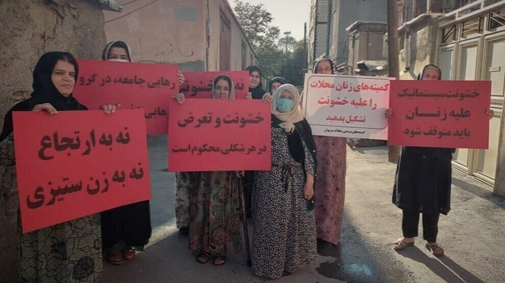
Women protesting military attacks
JINHA - Womens News Agency - September 6, 2023 - by Siruşa Amin
<<Iranian government uses paramilitary groups against protesters
News Center- Recently, Salafist/ Wahhabi groups have attacked the people in many
cities of Rojhelat (Eastern Kurdistan) with the support of Iran's Islamic
Revolutionary Guard Corps (IRGC) and security forces. Several days ago, these
groups attacked young people in the city of Marivan. According to eyewitnesses,
the identities of attackers were known, the government did not take any action
against them but arrested the people protesting the attack.
They threaten people
Despite the ongoing protests and criticism by people and activists, these groups
are supported by Iran's security forces. According to local sources, the Iranian
government employs these groups and gives them weapons to suppress the protests,
to threaten and intimidate citizens in the cities of Eastern Kurdistan. The
local sources say that these groups previously received military training from
the IRGC and carried out many attacks against civilians. The local people think
the main aim of these groups is to suppress the <Jin, Jiyan, Azadi (English:
Women, Life, Freedom> uprising and the reason why the Iranian regime uses them
is the influence of Salafism in Eastern Kurdistan.
The lives of women and girls are at risk
There is a serious increase in the rate of violence against women and girls in
Iran and Rojhelat. Recently, these groups have attacked women and girls with
acid. The recent acid attacks on women and girls recall the series of acid
attacks on women and girls in Isfahan in October 1993. Some men threw acid on
the faces of women and girls for not wearing their hijabs properly. The acid
attacks became a nightmare for many girls in Isfahan and other cities. Despite
the protests and demands for identification of the attackers, the case was
closed in 2017. Today, women and girls face the same attacks and their lives are
at risk. The Iranian regime keeps creating terror in society. Despite
everything, the people are determined to demand their freedom.>>
Source:
https://jinhaagency1.com/en/actual/iranian-government-uses-paramilitary-groups-against-protesters-33806

Note by Gino d'Artali: read below the supporting and brave words of our
Afghanistan sister Sadaf Omari:
Jinha - Womens News Agency - September 5, 2023 - by BAHARİN LEHİB
<<'Women will not bow to the Taliban'
Parwan- Millions of Afghan women and girls have been deprived of their right to
education since the Taliban takeover of Afghanistan. When the Taliban took
control of the country, Sadaf Omari was a tenth grader.
'My goal was to study archeology'
Living in Parwan, Sadaf Omari’s goal was to study archeology after graduating
from high school. <However, the Taliban banned all girls and women from
attending school. Now, parents marry off their daughters to protect them from
the Taliban,> she told NuJINHA.
'My biggest fear is to be married off'
<My parents want me to study,> she said, <However; they can marry me off due to
the current situation. I help my younger brother with his homework. I teach
girls English at home. Women and girls face more pressure by the Taliban every
day. I have been subjected to insults by the Taliban members for not covering my
hair.>
'We will not bow to the Taliban'
Sadaf Omari added, <Whenever the members of the Taliban threaten women, I feel
happier because I see how they are afraid of women. I have decided not to wear a
hijab despite everything. As women, we will not bow to the rules of the
Taliban.>
Source incl. video:
https://jinhaagency1.com/en/actual/women-will-not-bow-to-the-taliban-33801
Iranwire - September 5, 2023
<<Lawyer Meets Iranian Singer Jailed for Supporting Women's Rights
The defense lawyer representing Iranian singer Mehdi Yarrahi says he has been
able to meet his client in Tehran's Evin prison on September 5, eight days after
his arrest for his latest song encouraging women to remove their mandatory
headscarves. Yarrahi appeared to be in good spirits, but he is receiving medical
attention at the prison's hospital for inflamed skin and pain in his right ear,
lawyer Mustafa Nili said in a series of tweets. <I haven't been able to read his
case yet, and that's why I can't say what the exact charges are. I hope to be
able to read the case on Saturday,> Nili added. During the meeting, the singer
conveyed his determination to take legal action against officers who failed to
uphold the law and respect his civil rights during his arrest. Yarrahi was
arrested on August 28 following the release of the song Roosarito, or Your
Headscarf in English, which was accompanied by a video showing women in various
social settings without their mandatory headscarves, some dancing to the music.
Yarrahi dedicated the song to the <brave women of Iran who shine courageously at
the forefront of the 'Women Life Freedom’ movement,'> a reference to the
monthslong nationwide protests sparked by the September 2022 death of
22-year-old Mahsa Amini while she was in police custody for an alleged hijab
violation. As a protest against Yarrahi's arrest, Iranian social media users
posted and shared videos of their own dance performances and renditions of his
songs.
Artists, political activists and journalists have also rallied behind the singer
since his jailing.
The Iranian authorities, fearing a flare up in protests ahead of the first
anniversary of Amini's death on September 16, have ramped up their crackdown
against dissent in recent weeks. A growing number of women refusing to wear a
head covering have been arrested and prosecuted, while dozens of businesses have
been closed for failing to enforce compulsory hijab rules for women visitors. On
September 4, local media reported that the Mojhaye Khorushan water park in
Mashhad has been shut down for allowing women entry without a headscarf.
Mohammad Babaei, the complex manager, was quoted as saying that the authorities
had declared the park's closure due to people's <ignoring chastity and hjiab>
rules.>>
Source:
https://iranwire.com/en/society/120151-lawyer-meets-iranian-singer-jailed-for-supporting-womens-rights/

NCRI - Womens committee - in women's news - September 1, 2023
<<Hijab law slammed as <gender apartheid> by UN experts
Hijab law could amount to <gender apartheid,> UN experts say
The Office of the High Commissioner for Human Rights issued a statement today,
on September 1, 2023, in which a group of UN Human Rights Council-appointed
experts slammed Iran’s draft Hijab law. The experts said the bill could amount
to <Gender Apartheid.> They expressed concern that the new Hijab law in Iran
sanctions new punishments for women and girls who fail to wear the headscarf, or
hijab, in public. <The draft law could be described as a form of gender
apartheid, as authorities appear to be governing through systemic discrimination
with the intention of suppressing women and girls into total submission,> the UN
human rights experts said. They reiterated that the proposed parliamentary Bill
to Support the Family by Promoting the Culture of Chastity and Hijab and
existing restrictions are inherently discriminatory and may amount to gender
persecution. <The draft law imposes severe punishments on women and girls for
non-compliance which may lead to its violent enforcement,> the experts warned
and added that the new hijab law would <disproportionately affect economically
marginalized women.> The experts urged the Iranian authorities to <reconsider
the compulsory hijab legislation in compliance with international human rights
law, and to ensure the full enjoyment of human rights for all women and girls in
Iran.> The experts who wrote the statement are Javaid Rehman, Special Rapporteur
on the situation of human rights in the Islamic Republic of Iran; Irene Khan,
Special Rapporteur on the promotion and protection of the right to freedom of
opinion and expression; Alexandra Xanthaki, Special Rapporteur in the field of
cultural rights; and Dorothy Estrada Tanck (Chair), Elizabeth Broderick, Ivana
Radačić, Meskerem Geset Techane and Melissa Upreti, Working group on
discrimination against women and girls.
The full text of the statement follows:
Iran's proposed hijab law could amount to <gender apartheid>: UN experts
GENEVA (1 September 2023) - UN experts today expressed grave concern over a new
draft law, currently under review in the Iranian parliament, which imposes a
series of new punishments on women and girls who fail to wear the headscarf (hijab).
<The draft law could be described as a form of gender apartheid, as authorities
appear to be governing through systemic discrimination with the intention of
suppressing women and girls into total submission,> the experts said. They
stressed that the proposed <Bill to Support the Family by Promoting the Culture
of Chastity and Hijab> and existing de facto-restrictions are inherently
discriminatory and may amount to gender persecution. <The draft law imposes
severe punishments on women and girls for non-compliance which may lead to its
violent enforcement,> the experts said. <The bill also violates fundamental
rights, including the right to take part in cultural life, the prohibition of
gender discrimination, freedom of opinion and expression, the right to peaceful
protest, and the right to access social, educational, and health services, and
freedom of movement.> The use of culture by the Iranian government as a tool to
restrict the rights of women and girls is misplaced, the experts warned.
<Culture is formed and evolves with the participation of all,> they said. By
using terms such as <nudity, lack of chastity, lack of hijab, bad dressing and
acts against public decency leading to disturbance of peace>, the draft law
seeks to authorise public institutions to deny essential services and
opportunities to persons who fail to comply with compulsory veiling. Directors
and managers of organisations who fail to implement the law could also be
punished.
The New Hijab Bill: Parliamentary Legal Commission Concludes Deliberations
<The weaponisation of <public morals> to deny women and girls their freedom of
expression is deeply disempowering and will entrench and expand gender
discrimination and marginalisation, with wider negative consequences for
children and society as a whole,> the experts said. The morality police have
also been reportedly redeployed in some areas since early July 2023, potentially
to enforce compulsory veiling requirements. <After months of nationwide protests
over the death of Jina Mahsa Amini and against restrictive veiling laws, the
authorities have introduced a tiered system of punishments targeting women and
girls,> the experts said. <The punishments include deprivation of a range of
basic freedoms and social and economic rights, which will disproportionately
affect economically marginalised women,> they said. The Chastity and Hijab bill
was submitted to parliament by the Government and the judiciary on 21 May 2023.
Since then, it was amended several times, with the latest draft significantly
increasing the number of punishments for non-compliance. On 13 August 2023,
parliament voted in favour of invoking Article 85 of the Constitution which
allows a parliamentary committee to review legislation without public debate.
<We urge authorities to reconsider the compulsory hijab legislation in
compliance with international human rights law, and to ensure the full enjoyment
of human rights for all women and girls in Iran,> the experts said.>>
Source:
https://women.ncr-iran.org/2023/09/01/hijab-law-gender-apartheid/
Iranwire - August 30,2023 - by SAMANEH GHADARKHAN
<<Female Students Told to Wear Hijab and Keep Quiet – Or Get Expelled
The new school year has yet to begin in Iran, but it appears that certain school
principals have issued warnings to families and students, cautioning them
against engaging in any form of protest. The warnings have been accompanied by
threats of potential expulsions. One expressed has voiced concerns about the
heightened possibility of widespread chemical attacks targeting schools in the
upcoming year. A mother of a student from southern Shiraz told IranWire that the
school's principal, during a preparatory session prior to the school's
reopening, admonished the students to adhere to the hijab dress code and that
any students participating in protests would be expelled. Students themselves
meanwhile are embarking on the new school year burdened by distressing and
unsettling recollections of the threats, suppressions, arrests, chemical
attacks, and instances of explicit material being shown in some girls' schools,
during the previous year. With the imminent reopening of schools coinciding with
the anniversary of the death of Mahsa Amini and the acceleration of Woman, Life,
Freedom movement, and the potential for exerting pressure on students, there has
been a notable absence of any government institution or official addressing the
issue of ensuring school security this year. A teacher from a girls' school in
Shiraz, also the mother of two daughters aged 17 and 9, shared with IranWire her
concerns about the impending reopening of schools. For security reasons, the
teacher referred to as Shahrzad in this report has chosen to remain anonymous.
Shahrzad's elder daughter is set to graduate this year, while her younger child
will be starting the third grade in elementary school. The teacher explains that
due to protests that occurred at her elder daughter's school last year, she has
now been enrolled at a different school. During the previous school year, just
before nationwide protests, Shahrzad's older daughter's school in Shiraz became
one of the first where protests took place. The school principal had called
security forces, and footage from the school's surveillance cameras along with
students' academic records were handed over to these forces. As a result, eight
students were suspended for three days, and the intelligence department also
contacted other students. Shahrzad noted that after the incident, multiple
protest gatherings occurred at the school, prompting the implementation of
stringent rules by the principal. <They staggered the students' break times to
prevent them from congregating in the courtyard simultaneously,> she says. <The
children were not allowed to assemble. The rules extended to enforcing dress
codes, hairstyles, and even the length of the children's nails. Girls who wore
scarves around their necks were threatened with expulsion.> Regarding the high
school her daughter attended last year, Shahrzad remarks that the issue of hijab
held significant importance. The school's principal, who supports the
government, put considerable stress on the students. <I warned her multiple
times about the potential negative consequences of such actions, but my warnings
had no impact,> Shahrzad says. <Despite resistance from the school
administration, I chose to have my daughter study at a school removed from these
issues. In her new school, there is currently no indication of strict hijab
enforcement. Students are even allowed to sit without wearing coats in class,>
she adds. Shahrzad emphasizes that the implications of the proposed new hijab
regulations will become apparent in the upcoming year.
'Do You Offer Any Assurance of Student Safety?'
Shahrzad's younger daughter is enrolled in elementary school. She recounts that
during the previous week, the school's principal conducted a meeting with
parents to discuss security measures being implemented in response to external
events. The principal assured parents that there was no cause for concern and
that the school had taken necessary steps to ensure the safety of their
children. During this meeting, the school's principal emphasized the mandatory
nature of certain policies for the upcoming academic year, including the
students' adherence to hijab standards. The directives were in accordance with
the education guidelines, the principal said, and parents who held differing
views were free to transfer their children to other schools. <Parents are
grappling with major concerns, entering the new year with apprehension about
potential new developments. We live in a country where we must remain vigilant
for unexpected occurrences each day, unsure of what new challenges lie ahead.
The atmosphere is relatively calm for now, but we will see what happens,>
Shahrzad remarks. Another mother, Farzaneh, whose 12-year-old daughter
experienced the distress of threats from school staff last year concerning
protests and even chemical attacks, also says that her daughter's school
principal warned of potential students dismissals in cases of student
gatherings, chanting, or failing to wear scarves on school premises.
'Anticipate More Severe School Attacks This Year'
A series of incidents involving deliberate poisoning, commonly referred to as
chemical attacks on schools, took place in hundreds of girls' schools across
Iran during the previous school year. These events involved a significant number
of students from Iranian educational institutions falling victim to mysterious
poisonings. The first of these attacks was recorded on November 30 in a girls'
high school in central Qom. The impact of these attacks was not confined solely
to Qom; rather, they extended to various cities across Iran. The majority of
affected students were girls, although a few cases of poisonings were also
reported in boys' schools. The occurrences of chemical attacks on schools and
the suppression of students during the previous academic year have sparked
concerns regarding the entity or organization responsible for safeguarding the
lives and wellbeing of children and adolescents. Journalist and former vice
president of public relations for education, Nejat Bahrami, raises alarm about
the vulnerable state of schools in the upcoming academic year. According to him,
the structure for maintaining school security assigns general responsibilities
to various entities, including the police force and municipal authorities. <At
present, the security arrangement for schools primarily relies on the presence
of custodians,> he says, which <which inadequate considering the existing
threats.> School custodians typically oversee only maintenance, cleanliness and
upkeep. <In times of crisis, it might become necessary to temporarily seek
police protection by pressuring or influencing parents of students in public
schools, particularly in situations like chemical attacks on schools,> Bahrami
further explains. He adds that during the previous year, in response to the
surge in chemical attacks on schools, some nonprofit institutions enlisted the
police for added security. In instances of crises, attacks, or conflicts in the
school, custodians should liaise with law enforcement and security agencies, he
said.>>
Source:
https://iranwire.com/en/women/119959-female-students-told-to-wear-hijab-and-keep-quiet-or-get-expelled/
Read also all about the biological terrorattacks against
schoolgirls by clicking here
Iranwire - August 29, 2023 - by ROGHAYEH REZAEI
<<Yasaman Rezaei Babadi: Threatened with Rape if She Didn't
Confess
Yasaman Rezaei Babadi is a young woman who has been arrested
multiple times for her participation in nationwide protests sparked by
the death in police custody of Mahsa Amini in September last year.
During her detentions, she endured torture, physical assaults and
threats of being killed. On one occasion, she was threated of being
raped by plainclothes personnel. These events unfolded while she was
being interrogated at the Karaj Intelligence Detention Center and the
Moral Security Detention Center in the city.
Arrested on the Street, Coerced Confession, False Promises of Release
Rezaei, 27, a psychology graduate from Karaj University, was
beaten with batons and apprehended by plainclothes men in November 2022
while she was protesting in the streets of Karaj, near Tehran. With her
consciousness hanging by a thread, the young woman was thrown into a
van, where she was questioned about her attire and home address. One
officer accused her of being a protest leader, triggering another bout
of beatings.
They slammed her head against the van's wall in an attempt to
force her to confess.
A person with knowledge of Rezaei's ordeal told IranWire that she
was taken to the Moral Security Detention Center, where she faced
intense interrogation. The interrogators promised she would be freed
immediately if she admitted guilt, and threatened her of sexual abuse if
she refused.
The source said that Rezaei signed all the documents that were
presented to her. After that she was transferred to Karaj Detention
Center and spent the night there.
The next morning prosecutors ordered her transfer to Kachooei
prison in Karaj, where she remained for a week. In mid-November, Rezaei
was released after posting a 1-billion-toman ($20,000) bail, a sum her
family struggled to gather. Rezaei was eventually exonerated of
the charges against her under an <amnesty> offered by Supreme Leader Ali
Khamenei. According to
documents obtained by IranWire, Rezaei faced charges of <propaganda
activity> against the Islamic Republic and <illegal assembly, causing
public disturbance and disorder" by <burning a headscarf.>
Second Arrest; Rape and Murder Threats
Rezaei's second arrest was linked to her participation in a
street protest against the execution of two protesters: Mohammad Mehdi
Karmi and Seyyed Mohammad Hosseini. The men were hanged on January 7
after being found guilty of killing a member of the paramilitary Basij
force during anti-establishment demonstrations. A source told IranWire
that Rezaei was arrested by security forces in Karaj’s Gohardasht
neighborhood at around 6 p.m. on January 7.
<Seven to eight individuals surrounded her and subjected her to
physical assault. They accused her of suffering a mental ailment,
menacingly declared that she was worthless, and said that six of them
would rape her.> According to another source, the young woman was taken
to the Karaj Moral Security Detention Center, where many other
protesters were being held.
<They touched her body, including her breasts and genitals,> the
source said.
A prosecutor ordered her to spend three months at the Imam
Hossein Psychiatric Hospital.
<They perpetuated the narrative that Yasaman was mentally
unstable until the presiding judge mandated a psychiatric evaluation.
She underwent examinations twice, and the psychiatrist attested she was
mentally healthy,> the source said.
In May, she was summoned to a branch of the Revolutionary Court
in Karaj to face the charge of spreading <propaganda through slogan
writing,> according to documents obtained by IranWire. <They
administered her pills every day, leaving her in a state of discomfort.
Despite this, they relentlessly interrogated her. They wanted to know
who was giving her orders, questioned her about her chants, the burning
of her headscarf. No detail was too trivial,> the source said.
<Fortunately, her family managed to secure her release from the hospital
after a month and a half.>
Third Arrest, Threats to Be Killed
The source told IranWire that Rezaei was arrested for a third
time in late July, right in front of the building of Karaj Moral
Security Police where she planned to protest against the torments she
endured in the detention facility. Once again, she was subjected to
severe beatings, including kicks and punches.
The source said that an individual named Torkashvand, the
purported commander of the Moral Security Center, threatened her with a
firearm. IranWire could independently verify the accuracy of the name
and position of this man. According to the source, a security agent
brandished a knife and warned Rezaei that she would be dismembered.
<Torkashvand declared that they had a warrant for shooting her.
They subjected her to relentless beatings during five to six hours
within the confines of the Moral Security Police headquarters. A gun was
ominously held over her head, while they accused her of receiving funds
from [US-based activist] Masih Alinejad.>
The source said that Rezaei was coerced into writing whatever
they dictated to her, promising her freedom.
Rezaei was then transferred back to the Karaj Intelligence
Detention Center, where she stayed for approximately a week, after which
she once again underwent a mental health evaluation. Finally, in early
August, the young woman was provisionally released, pending the issuance
of a verdict. <The
prosecutor handling her case is compassionate, and this time she was
granted release on bail,> the source said. <Just a few days ago, she
returned to the prosecutor to give her final statement. She was
compelled to pledge not to participate in any events marking the
anniversary of Mahsa Amini's death.> Ahead of the anniversary, the
pressure on protest detainees, their families and civil activists has
significantly intensified.>>
Source:
https://iranwire.com/en/women/119925-yasaman-rezaei-babadi-threatened-with-rape-if-she-didnt-confess/
Iranwire - August 24 2023 - by ROGHAYEH REZAEI
<<Where is Parmida, Who Said <I'm a Woman, Don't Intimidate Me with Anything>?
Amid a social media campaign aimed at uncovering the whereabouts of Parmida
Shahbazi, a woman who boldly told an official's hijab warning <I'm a woman,
don't intimidate me with anything,> information obtained by IranWire indicates
she has been granted release on bail. Sources said that the prevailing public
apprehension about the lack of information concerning Parmida's fate stems from
the coercive tactics used by security agents against the young woman and her
family which have compelled them into silence.
Who is Parmida Shahbazi; Where Is She?
There has been limited information about Parmida Shahbazi. A video shows her
wearing a white shirt and without a headscarf being confronted by an individual
claiming to be a <judicial officer> in the city of Karaj, near Tehran. The man
seeks to intimidate the young woman by alleging that she had insulted him. The
individual called her a <criminal,> citing Article 638 of the Islamic Penal
Code, saying she committed <blasphemy> during a religious procession. <Don't
attempt to intimidate me. I'm a woman, resolute in my beliefs,> she replied. The
Alborz Police Command's Information Center later confirmed the woman's arrest
and warned that those responsible for sharing the video online will be handed
over to judicial officials. On July 20, Fars news agency announced her arrest in
a report featuring a video in which Shahbazi <confessed> and offered an
<apology.> In the 36-second video, the woman's face is entirely obscured and she
is referred to as <a woman who desecrated the sanctity of the procession of Imam
Hossein in Karaj.> Neither the news agency nor Parmida Shahbazi's family
explicitly divulged the name of the woman on the video, but social media users
identified her as Parmida Shahbazi. A source confirmed to IranWire that it was
Parmida Shahbazi but did not know the details surrounding her arrest, the
charges she faces and her release on bail. <[The family] faced so many threats
and so much coercion that they're hesitant to confide in those close to them.
All we know is that she was released on bail,> the source said. Fatemeh Masjedi,
a women's rights advocate and social historian, told IranWire that Shahbazi was
arrested <her words emanate strength and fearlessness.> <This significance is
encapsulated within the concise sentences she utters, which signify a departure
from the era of subservience to male authority,> she said.>>
Source:
https://iranwire.com/en/women/119785-where-is-parmida-who-said-im-a-woman-dont-intimidate-me-with-anything/
NCRI - Womens committee - in women's news - August 20, 2023
<<The New Hijab Bill: Parliamentary Legal Commission Concludes Deliberations
The deliberations on Iran's new Hijab Bill have concluded within the Legal
Commission of the clerical regime's parliament, as announced by Moussa Ghazanfar
Abadi, the commission's chair. (The state-run Etemadonline.ir, August 20, 2023)
This 70-article bill, titled <Supporting the Family through Promotion of the
Culture of Chastity and Hijab,> is currently awaiting placement on the
parliamentary agenda for open floor discussion, during which the parliament will
decide the trial period for the bill's enforcement.
Lack of Transparency in the Examination Process
Remarkably, the Legal Commission concluded its deliberations on all 70 articles
of the new hijab bill within a mere week, with the initial 39 articles being
approved within the first two days. Speculation surrounds the actual content of
the new Hijab bill and the extent to which proposed amendments have been
adopted.
The New Hijab Bill: Parliamentary Legal Commission Concludes Deliberations
Among the suggested changes is an amendment to Article 1 that would prohibit
men's entry into women's spaces, including clubs, stadiums, hairdressers, metro
wagons, parks, and other forms of public transportation, and vice versa. This
means that women would also be prohibited from entering sports stadiums where
men are present, as dictated by the new Hijab bill. Another contentious proposal
pertains to the requirement for women and girls-both teachers and students-to
wear the black head-to-toe Chador in all universities and high schools. Female
educators would also face restrictions, including a ban on artificial nails and
eyelashes. Speculation further extends to potential measures such as the
involvement of seminary students in educational institutions and the granting of
permits to Basij members to carry deterrents like shockers and sprays for
dealing with Hijab law violations. The exact details of the bill, as approved by
the Legal Commission of the mullahs' parliament, remain undisclosed and await
revelation.
The New Hijab Bill: Parliamentary Legal Commission Concludes Deliberations
Examining the New Hijab Bill Under Article 85
On Sunday, August 13, the clerical regime's parliament voted to assign the
examination of the Hijab and Chastity bill to the Legal Commission, invoking
Article 85 of the Constitution, instead of debating it directly on the open
floor. This decision was made due to the substantial number of amendments-over
1600-proposed by 59 representatives. It was reasoned that discussing the bill in
an open session could lead to extended delays and be tantamount to
<non-approval.> Simultaneously, there was a pressing need to expedite the bill's
passage. The parliamentary vote in favor of this approach was 175 for, 49
against, with five abstentions. The laws adopted under Article 85, will be
implemented on a <trial basis> for a period of time determined by the parliament
and their final approval will be subject to the parliament's decision.>>
Source:
https://women.ncr-iran.org/2023/08/20/the-new-hijab-bill/
Opinion by Gino d'Artali: I said it not so long ago: the regime more and more is
moving towards a same kind of dictatorship as there is in Afghanistan and life
there for girls and women is in one word unbearable. And that's exactly where
Iran and its mullahs want the country to head to and ... the rest does not be
said nor described. Still, the women and girls are not going to give in that
easily because their demands spoken some months ago will be shouted again, be it
more loud and clear: <give in or go away!>.
Womens'
Liberation Front 2019/cryfreedom.net 2023














